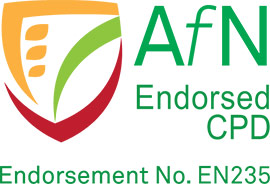
Free
60mins
Health before pregnancy to improve outcomes
Dr Angela Flynn, Dr Caroline Childs
CONTENT AND LEARNING OBJECTIVES:
Clear understanding of:
- Preconception health behaviours and risk factors
- Health behaviours of UK women planning pregnancy
- Preconception intervention evidence
Be aware of:
- Importance of preconception health
- Preconception recommendations
- Summary of evidence on preconception intervention
Be able to:
- Summarise the key messages around the importance of preconception health, the latest scientific evidence and the current guidelines in the UK
Help us to continue providing expert nutrition learning
If MyNutriWeb has helped you deepen your knowledge of dietary and nutritional subjects, join us to help support and educate people to eat well for themselves and the planet. Read more...

Expert speaker
Dr Angela Flynn
Lecturer in Nutritional Sciences at King’s College London
Dr Angela Flynn is a Lecturer in Nutritional Sciences at King’s College London. She started her career as a community pharmacist in Ireland and subsequently completed an MSc in Nutrition followed by a PhD in Maternal Nutrition at King’s College London. Her research focuses on developing and testing interventions to improve outcomes for women before, during and after pregnancy, particularly women at higher risk of developing pregnancy complications. Other interests include looking at the relationship between maternal micronutrient status and pregnancy outcomes. She also works closely with other health professionals on projects aimed at improving preconception and pregnancy health.
Paper reference
The session discusses the paper: Myo-Inositol, Probiotics, and Micronutrient Supplementation From Preconception for Glycemia in Pregnancy: NiPPeR International Multicenter Double-Blind Randomized Controlled Trial
This paper assesses the effect of a preconception and pregnancy intervention on pregnancy outcomes. In a randomized controlled trial, it investigated whether a nutritional formulation containing myo-inositol, probiotics and multiple micronutrients (intervention), compared with a standard micronutrient supplement (control), taken preconception and throughout pregnancy could improve pregnancy outcomes.

About Journal Club Chair, Dr Caroline Childs
Each Journal Club session is chaired by Dr Caroline Childs, Nutrition and Metabolism subject lead in Medicine at the University of Southampton. She received student-nominated awards for ‘most engaging lecturer’ and ‘best pastoral support’ and a colleague-nominated award for teaching excellence. Dr Childs is a Nutrition Society Ambassador and a South East Regional Representative for the Association for Nutrition.
As she says, “Developing skills in critical appraisal is an essential part of being a competent nutrition professional – whether you’re a dietitian, nutritionist or health professional specialising in nutrition.”
APPRAISING RESEARCH PUBLICATIONS
Nutrition research reported in the media often highlights mixed or contradictory results between studies. So, as a nutrition professional, how can you ensure you use the strongest available evidence to inform your practice?
CPD CERTIFICATE & LEARNING MATERIALS
This webinar has been approved for CPD by the AfN

Once you have viewed a full session the mynutriweb team will review and arrange to send you your certificate via email from hello@mynutriweb.com within two weeks of viewing the webinar.
Popular Now

Probiotics in the Management of Gut Disorders: What is the evidence?

South Asian Eatwell Guide

Protein: for exercise performance and recovery
Feature in a Webinar
Webinar guest experts encompass topics relevant to all professionals and change agents in food and health, across all health and business sectors.
Would you like to feature in a webinar, or propose a guest expert?
Sponsor a webinar
MyNutriWeb offers organisations and brands an opportunity to sponsor topics, gaining valuable insights into the viewpoints of professionals within a moderated environment. If there is a topic that you would like to support please get in touch to discuss.
This website is intended only for students or professionals working in food, nutrition and health. If this is you, please click to continue.



